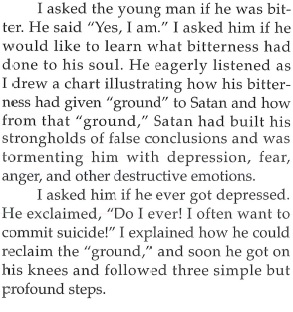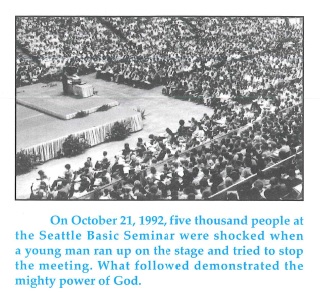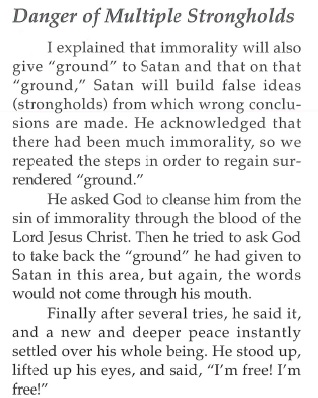Wouldn’t it be nice if you could get instant freedom from fear, anger and depression? That’d be great. Would you commit to attending a week-long seminar if you could get instant freedom from it?
Today I was looking through a booklet titled Ten Reasons for Alumni to Be Encouraged. It was sent out in 1992 to families that had previously attended a Basic Seminar. While working very hard to look like an informational booklet, this mailing was really nothing more than an advertisement meant to bring money in from seminar alumni.
Throughout the booklet there runs a theme of instant solutions to all your problems. The image above is perhaps the most blatant promise of instant solutions, but it is far from the only one. Before we take a look at them in more detail, you can enjoy some non-approved music.
Gothard recounts the story of a young man who rushed the stage during a Basic Seminar in Seattle. The man was subdued by security, and taken to a side room while Gothard continued the meeting. During the break, Gothard visited this man and tried to help him. The man said that he had heard a voice claiming to be “the Prince of Seattle” who had told him to stop the seminar. 
Here we have a man who obviously has some rather serious mental health issues. He is hearing voices with enough clarity and force that he will rush the stage in front of 5,000 people, and has to be forcibly removed. He admits to frequent thoughts of suicide. These are not minor, small issues. This guy needs help.
Now let’s look at the help that Gothard offered. First, we should note that the concept of giving ground to Satan, and reclaiming ground from Satan, is not Biblical. The Bible teaches us that our old man is sinful by nature, and that we are in the process of being transformed into the image of Christ. It does not teach a chessboard version of the soul, with Satan as an easily defeat-able opponent if we simply follow Gothard’s three step plan.
Second, note how this promise to free someone of fear, anger and depression comes with major strings of guilt attached; if “depression, fear, anger and other destructive emotions” are the direct result of Satan building a castle on surrendered ground in your soul, then anytime you experience any of those emotions, you can be sure that you have failed. You’ve given ground to Satan, again.
Third, it’s interesting to see how anger and fear are listed as “destructive emotions.” Anger is actually a very healthy emotion under some circumstances (to give a random example; if you heard a story about an elderly religious leader using his position of authority to make unwanted sexual advances on teenage girls…well, that should make you angry.) In many cases, fear is a healthy emotion (again, a totally random example; if you were a teenage girl who was sent to work with an elderly religious leader who gave you money to purchase a push-up bra…well, you should feel fear!) Negative emotions are not always destructive emotions. This is an important distinction.
So, to continue the story; Gothard had this guy go through the three steps (confess the sin, claim the blood of Christ and ask God to retake the ground from Satan), and “a peace came over him.” But then the story gets even more interesting; the man asks, “What about the beast I see with seven heads?” Gothard asked the man if he had participated in any sexual sin, and the man said yes.
Notice how quickly this “freedom” the young man gained is lost! It seems Gothard himself doesn’t even realize the inherent contradiction in his story; he promises freedom, but only if you take back every single stronghold. How are you to know if you’ve confessed them all? How are you to know if you’ve taken back each piece of ground? Since very natural emotions such as anger or fear are the signposts of ground that has been given to Satan, how are you to ever feel confident that your soul is truly safe?
The most disturbing part of this story comes when this young man tries to ask God to take back the ground, and the words stick in his mouth. We can learn something very scary about Gothard’s entire view of the Christian experience from this; when someone was bound by sin, and needed to turn from it, he had to rely on his on strength to do it. There is no mention of calling on God for strength, or turning to your Christian brothers for support. Nope, you just sit there, bound by Satan and this stronghold that he’s built in your soul, until you find the umph within yourself to speak the magic words.
This is terrifying. Thank God that he does not wait for us to gather the power to defeat Satan! “God is our refuge and strength, a very present help in trouble.” (Ps. 46:1) “Likewise the Spirit helps us in our weakness. For we do not know what to pray for as we ought, but the Spirit himself intercedes for us with groanings too deep for words.” (Rom. 8:26)



